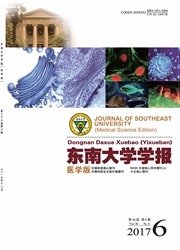

 中文摘要:
中文摘要:
目的:通过分枝杆菌热休克蛋白保守性B细胞表位多次免疫小鼠,研究热休克蛋白65(HSP65)与动脉粥样硬化之间的关系。方法:PCR技术扩增出HSP65上与动脉粥样硬化密切相关的6个B细胞表位基因。将这6个表位的基因分成两组,分别与CTB基因相融合并在大肠杆菌中表达。两种蛋白表达产物经过分离、纯化、混合复性,复性后的蛋白经GM1-ELISA证明可在体外自组装成5聚体。甩复性后的重组蛋白小剂量多次滴鼻免疫ICR小鼠,然后用大量的HSP65蛋白经皮下免疫,采集血样,ELISA检测小鼠血清中抗HSP65的抗体。结果:重组蛋白预免疫ICR小鼠后,可以使免疫组较对照组对随后的大量HSP65刺激产生更加强烈的免疫反应。结论:分枝杆菌热休克蛋白保守性B细胞表位经鼻黏膜的反复预免疫强化了小鼠对随后攻击性免疫的反应。
 英文摘要:
英文摘要:
Objective To investigate strengthening effect of Mycobacterium Tuberculosis' conservative B cell epitopes and study the relationship between heat shock protein 65 ( HSP65 ) and atherosclerosis. Methods Six B cell epitopes closely correlated with atherosclerosis were cloned and divided into 2 groups, followed by infusion into cholera toxin B subunit (CTB)gene and expression in Escherichia coli respectively. Two expressing products were purified,then mixed and renaturated. GM1-ELISA manifested that the renaturated protein could be assembled into pentamers in vitro. ICR mice were preimmuned with the renaturated protein via membrana mucosa nasi, then subcutaneously injected high dose of HSP65. Results Pharmacodynamics experiment indicated that ICR mice preimmuned with the renaturated protein induced more strong response against HSP65 than the control group. Conclusion Mucosal immunization with heat shock protein' conservative B cell epitopes of mycobacterium tuberculosis strengthens the subsequent immune rosponses.
 同期刊论文项目
同期刊论文项目
 同项目期刊论文
同项目期刊论文
 Ten tandem repeats of beta-hCG 109-118 enhance immunogenicity and anti-tumor effects of beta-hCG C-t
Ten tandem repeats of beta-hCG 109-118 enhance immunogenicity and anti-tumor effects of beta-hCG C-t Inhibition effects on liver tumors of BALB/c mice bearing H22 cells by immunization with a recombina
Inhibition effects on liver tumors of BALB/c mice bearing H22 cells by immunization with a recombina A Th1-Recognized Peptide P277, When Tandem Repeated Enhances a Th2 Immune Response and Toward Effect
A Th1-Recognized Peptide P277, When Tandem Repeated Enhances a Th2 Immune Response and Toward Effect Construction, Expression, Purification and Immunology Effect of an Antiatherosclerosis Chimeric Enzy
Construction, Expression, Purification and Immunology Effect of an Antiatherosclerosis Chimeric Enzy Improved efficacy of DNA vaccination against breast cancer by boosting with the repeat beta-hCG C-te
Improved efficacy of DNA vaccination against breast cancer by boosting with the repeat beta-hCG C-te Long-lasting specific antibodies against P277 induced by mucosal administration of P277 repeat seque
Long-lasting specific antibodies against P277 induced by mucosal administration of P277 repeat seque A novel vaccine targeting gastrin-releasing peptide (GRP): efficient inhibition of breast cancer gro
A novel vaccine targeting gastrin-releasing peptide (GRP): efficient inhibition of breast cancer gro Purif ication and Stability Research of Mycobacterial Heat Shock Protein 65 and Its Fusion Protein H
Purif ication and Stability Research of Mycobacterial Heat Shock Protein 65 and Its Fusion Protein H A novel virus-like particle based on hepatitis B core antigen and substrate-binding domain of bacter
A novel virus-like particle based on hepatitis B core antigen and substrate-binding domain of bacter Strong humoral response elicited by a DNA vaccine targeting gastrin-releasing peptide with optimized
Strong humoral response elicited by a DNA vaccine targeting gastrin-releasing peptide with optimized Immunotherapy of Autoimmune Diabetes by Nasal Administration of Tandem Glutamic Acid Decarboxylase 6
Immunotherapy of Autoimmune Diabetes by Nasal Administration of Tandem Glutamic Acid Decarboxylase 6 Study on preparation and unique properties of a novel insulin analogue with N-terminal Arg-4, Pro-3,
Study on preparation and unique properties of a novel insulin analogue with N-terminal Arg-4, Pro-3, Improved efficacy of DNA vaccination against prostate carcinoma by boosting with recombinant protein
Improved efficacy of DNA vaccination against prostate carcinoma by boosting with recombinant protein Nasal immunization with heat shock protein 65 attenuates atherosclerosis and reduces serum lipids in
Nasal immunization with heat shock protein 65 attenuates atherosclerosis and reduces serum lipids in Specific Antibodies Elicited by a Novel DNA Vaccine Targeting Gastrin-Releasing Peptide Inhibit Muri
Specific Antibodies Elicited by a Novel DNA Vaccine Targeting Gastrin-Releasing Peptide Inhibit Muri Construction, expression, purification and immunology effect of an anti-atherosclerosis chimeric enz
Construction, expression, purification and immunology effect of an anti-atherosclerosis chimeric enz A novel vaccine targeting gastrin-releasing peptide: efficient inhibition of breast cancer growth in
A novel vaccine targeting gastrin-releasing peptide: efficient inhibition of breast cancer growth in A Th1-recognized peptide P277, when tandemly repeated, enhances a Th2 immune response toward effecti
A Th1-recognized peptide P277, when tandemly repeated, enhances a Th2 immune response toward effecti 期刊信息
期刊信息
